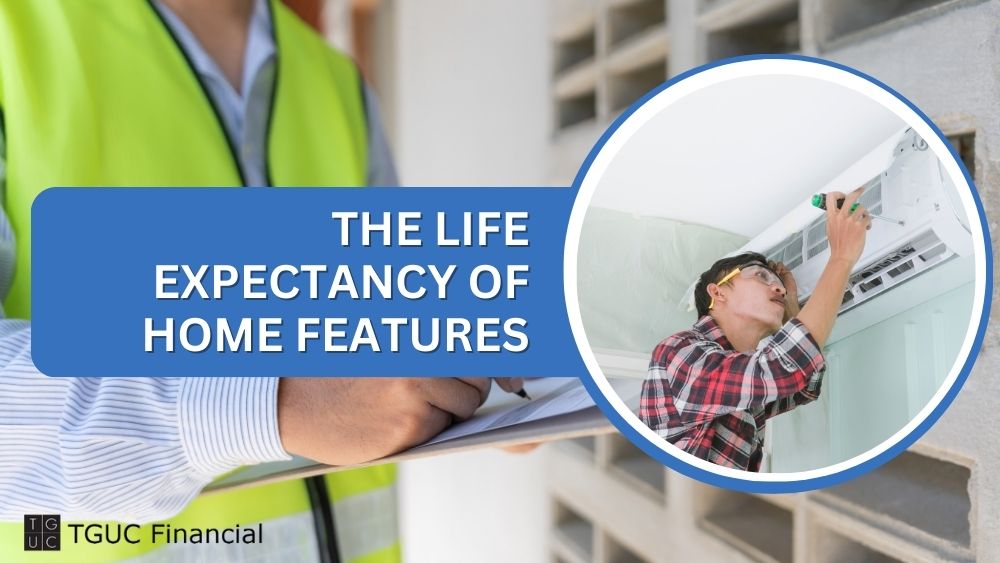Owning a home is a significant investment, and like any investment, it requires ongoing maintenance and occasional upgrades. Understanding the typical lifespan of various home features is crucial for effective budgeting and proactive maintenance planning. Knowing when to expect replacements can prevent unexpected expenses and ensure your home remains functional, comfortable, and retains its value. This guide will walk you through the expected lifespans of common home components, empowering you to make informed decisions regarding upkeep and renovations.
Breaking Down the Lifespans of Key Home Features
Knowing the average lifespan of your home’s components helps you anticipate necessary repairs or replacements, allowing you to budget accordingly and avoid disruptive surprises. Let’s explore the typical lifespans of various home features:
- Roofing Materials:
- Asphalt Shingles: 15-30 years (depending on climate and quality)
- Metal Roofing: 40-70 years
- Tile Roofing: 50-100 years (or more!)
- HVAC Systems:
- Furnace: 15-20 years
- Air Conditioner: 10-15 years
- Heat Pump: 15-20 years
- Major Appliances:
- Refrigerator: 10-15 years
- Oven/Range: 10-15 years
- Dishwasher: 9-10 years
- Washer/Dryer: 8-12 years
- Plumbing Systems and Fixtures:
- Water Heater: 8-12 years (tank) / 20+ years (tankless)
- Pipes (Copper): 50-70 years
- Pipes (PVC): Indefinitely (with proper installation)
- Faucets and Fixtures: 10-15 years
- Flooring:
- Hardwood: 25-100 years (depending on species, finish, and maintenance)
- Carpet: 5-15 years
- Tile: 75-100 years (or more!)
- Paint:
- Interior Paint: 5-10 years
- Exterior Paint: 5-10 years (depending on climate and quality)
- Windows and Siding:
- Windows: 15-30 years
- Vinyl Siding: 20-40 years
- Fiber Cement Siding: 50+ years
Extending the Life of Your Home Features
Proactive maintenance plays a crucial role in maximizing the lifespan of your home’s features. Here are some valuable tips:
- Regular Inspections: Schedule routine inspections for your roof, HVAC system, and plumbing to identify potential issues early on.
- Cleaning: Keep appliances, fixtures, and flooring clean to prevent premature wear and tear.
- Filter Changes: Regularly replace air filters in your HVAC system to maintain efficiency and air quality.
- Proper Ventilation: Ensure adequate ventilation in bathrooms and kitchens to prevent moisture damage.
- Landscaping: Maintain proper drainage around your foundation to protect against water damage.
- Minor Repairs: Address minor repairs promptly to prevent them from escalating into larger, more costly problems.
Key Takeaways for Proactive Home Care
Understanding the lifespan of your home’s features enables you to budget effectively, prioritize maintenance tasks, and make informed decisions about upgrades and replacements. By implementing preventative measures and addressing issues promptly, you can significantly extend the life of your home’s components, enhancing its value and ensuring long-term comfort and functionality.
Planning for Replacements with TGUC Financial
When the time comes to replace or upgrade home features, having a reliable financing option can make the process seamless and stress-free. TGUC Financial offers a range of contractor and consumer loans designed to help homeowners manage the costs associated with home improvements. Whether you’re facing a necessary roof replacement or planning a dream kitchen renovation, TGUC Financial can provide the financial support you need.
TGUC Financial offers:
- Contractor Loans: Specifically designed for home improvement projects, these loans help cover contractor costs, materials, and other project-related expenses.
- Consumer Loans: Flexible loans for homeowners to manage various expenses tied to upgrades and replacements.
- Competitive Rates and Terms: We work with you to find the most suitable financing solution based on your individual needs and financial situation.
Contact TGUC Financial today to learn more about our loan options and how we can empower you to enhance and maintain your cherished home.
FAQs about Home Feature Lifespans and Financing
- How often should I replace my roof?
The lifespan of a roof depends on the material. Asphalt shingles typically last 15-30 years, while metal roofs can last 40-70 years or more. Regular inspections can help determine the condition of your roof.
- What are the signs my HVAC system needs replacing?
Frequent repairs, decreased efficiency, inconsistent temperatures, and unusual noises can indicate your HVAC system needs replacing. Consult an HVAC professional for an assessment.
- How long do kitchen appliances usually last?
Refrigerators and ovens generally last 10-15 years, while dishwashers and washing machines tend to have slightly shorter lifespans of around 8-12 years.
- What is the average lifespan of a water heater?
Traditional tank water heaters last 8-12 years, while tankless water heaters can last 20+ years with proper maintenance.
- How can I make my flooring last longer?
Regular cleaning, prompt spill cleanup, and the use of protective mats can extend the life of your flooring. Refinishing hardwood floors can significantly extend their lifespan.
- When should I repaint my house?
Interior paint typically lasts 5-10 years, while exterior paint may need to be refreshed every 5-7 years, depending on climate conditions and paint quality.
- What are the signs my windows need replacing?
Drafts, difficulty opening and closing, condensation between panes, and rotting frames indicate it might be time to replace your windows.
- Does TGUC Financial offer financing for all home improvement projects?
TGUC Financial offers a range of contractor and consumer loans that can be utilized for a variety of home improvement projects, from roof replacements to kitchen renovations and more. Contact us to discuss your specific needs.
- What are the benefits of using TGUC Financial for home improvement loans?
TGUC Financial provides competitive rates, flexible terms, and personalized service to help homeowners find the most suitable financing options for their home improvement needs.


Recent Comments